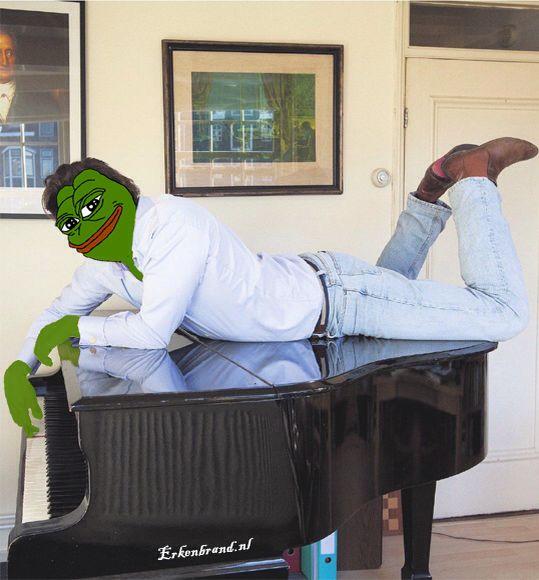
Memes, 4chan and the strategic ambivalence of Thierry Baudet
Forum for Democracy leader Thierry Baudet is the most meme-ified politician of the Netherlands and this is largely thanks to his popularity in Dutch alt-right circles. Baudet himself played an active part in garnering this status yet avoids to publicly affiliate himself with the alt-right. His intentions and motives thus remain ambivalent, and this is part of his political strategy.
Thierry Baudet: a living meme
Thierry Baudet has become a living meme, defined by the urban dictionary as a living person who has become iconic in pop culture. Put more aptly in the case of Baudet: a living person who has become iconic in alt-right-culture. By now, various memes of Baudet are circulating on the boards of 4chan and in particular the politically incorrect /pol/; a board frequented by the alt-right. It is therefore no surprise that the notoriously racist ‘study group’ Erkenbrand photoshopped alt-right’s infamous mascot Pepe the Frog onto the equally infamous picture of Baudet laying on his piano.

The above picture was taken from a /polder/ thread – the name given to threads on /pol/ that are dedicated solely to Dutch politics – that was created prior to the Dutch parliamentary elections of 2017. Most of the repliers in the thread seemed to be on board with Baudet and some of them were even taking the lead in organizing a meme campaign: ‘We need you for the last attacks of this meme war. Report for duty!’


But how did Baudet get so much support from this alt-right troll army? Of course, his ideas resonate with theirs but so do those of Geert Wilders. So why is Baudet so explicitly embraced and meme-ified?
Well, one week prior to the opening of the /polder/ thread, Thierry Baudet celebrated carnival and posted a video about it. It proves to exemplary of the strategically ambivalent way in which Baudet affiliates himself with the alt-right.
Frog business
At first glance, it seems like an odd combination: Thierry Baudet and carnival. Yes, he was campaigning, but is handing out flyers to half-drunken people the most efficient way of gathering support? Not particularly right? In spite of all this, Baudet chose the city of ‘s Hertogenbosch to celebrate carnival and when you watch the video, it immediately becomes clear that he has done his homework.
As one cannot enter Oeteldonk – ‘s Hertogenbosch’ alternative name during carnival – in regular clothing, Baudet dressed up properly and stuck to the traditional dresscode: an old jacket, a red-white-and-yellow shawl and, of course, frogs! After all, frogs are the mascots of Oeteldonk because, as legend has it, the area used to be filled with them due to the soggy soil in the Middle Ages. So, by dressing up appropriately and knowing his folkloric history, Baudet is accepted into the carnivalesque festivities and we can see him dancing and laughing with his fellow merrymakers.
Yet Baudet’s fashion choices do not only grant him access to the carnival community. By making (Pepe) the frog such a prominent feature of his outfit, Baudet also presumably shows his affiliation to the alt-right community. As Ico Maly has explained in an article on this website, Pepe the Frog has - after a series of appropriations by various groups and eventually the mainstream - been embraced by the alt-right as an expression of its struggle against the politically correct lamestream: the liberal establishment that sees racism and neo-nazi sentiments in everything (Maly 2018).
This ambivalence grants Baudet and the alt-right trolls the opportunity to deny their intended meaning whenever they are called out by the politically correct establishment for spreading mendacious ideas.
Naturally, it did not take long for people in the comment section to recognize the reference: ‘Praise Kek!’, ‘grassroots is the way to go. kek’ and ‘all hail our lord and savior Pepe and the thousand year kek reich’.
This is a perfect example of how the meaning of signs, symbols and expressions are dependent on the context in which they are placed. It is a process we call entextualisation (Maly 2018): a sign (a frog) is pulled out of its original context (the mascot of Oeteldonks carnival) and placed in a new context (Pepe the Frog) by which it receives a completely new meaning (it becomes a signifier of the alt-right).
The strategic ambivalence of Thierry Baudet
The result is strategic ambivalence, also known as Poe’s law (Maly 2018). Because the intentions of the author remain obscure, we cannot determine what Baudet actually meant by featuring the frog: is he simply trying to fit into the carnivalesque masses or is he intentionally flirting with the alt-right by flaunting its mascot? And even if he is doing the latter, does he do it for the lulz or does he want to show his sympathies for neo-Nazi groups like Erkenbrand?
This ambivalence grants Baudet and the alt-right trolls the opportunity to deny their intended meaning whenever they are called out by the politically correct establishment for spreading mendacious ideas.
Baudet normalizes the racist and dangerous discourse which he implicitly affiliates himself with under the guise of irony and humor.
For example, when Baudet retweeted a picture of Pepe and was asked to explain himself, he said that he was unaware of Pepe’s racist connotation. In fact, Baudet retaliates whenever he is associated with the alt-right or when he is called out for making dubious comments. In his eyes, such responses are exemplary of the way in which the fake news liberal establishment wants to curtail the right to free speech for the sake of political correctness; precisely the political message that Pepe stands for.
Beyond Pepe the Frog
We can thus see that Baudet is quite familiar with the trolling meme tactics of the alt-right and that he has succesfully won their support. Yet Baudet’s strategic ambivalence does not limit itself to memes; he has elevated it into a political strategy and makes active use of it when voicing his dubious political and societal ideas.
There are countless examples of Baudet’s flirts with dubious people and thoughts associated with the alt-right. Yet because Baudet has a fine understanding of Poe’s law, he cannot seem to be ‘caught’: call him out and you confirm his message, ignore him and you let him spread his dubious ideas. This is how, despite his tongue-in-cheek references to the extreme right, Baudet still manages to come across as a more moderate alternative to Geert Wilders.
Yet by making these references, Baudet also normalizes the racist and dangerous discourse which he implicitly affiliates himself with under the guise of irony and humor. This is the danger inherent in Baudet's trolling political tactics: you never quite know what you are up against.
References
Maly, I. (2018) Nieuw Rechts. Berchem: EPO.